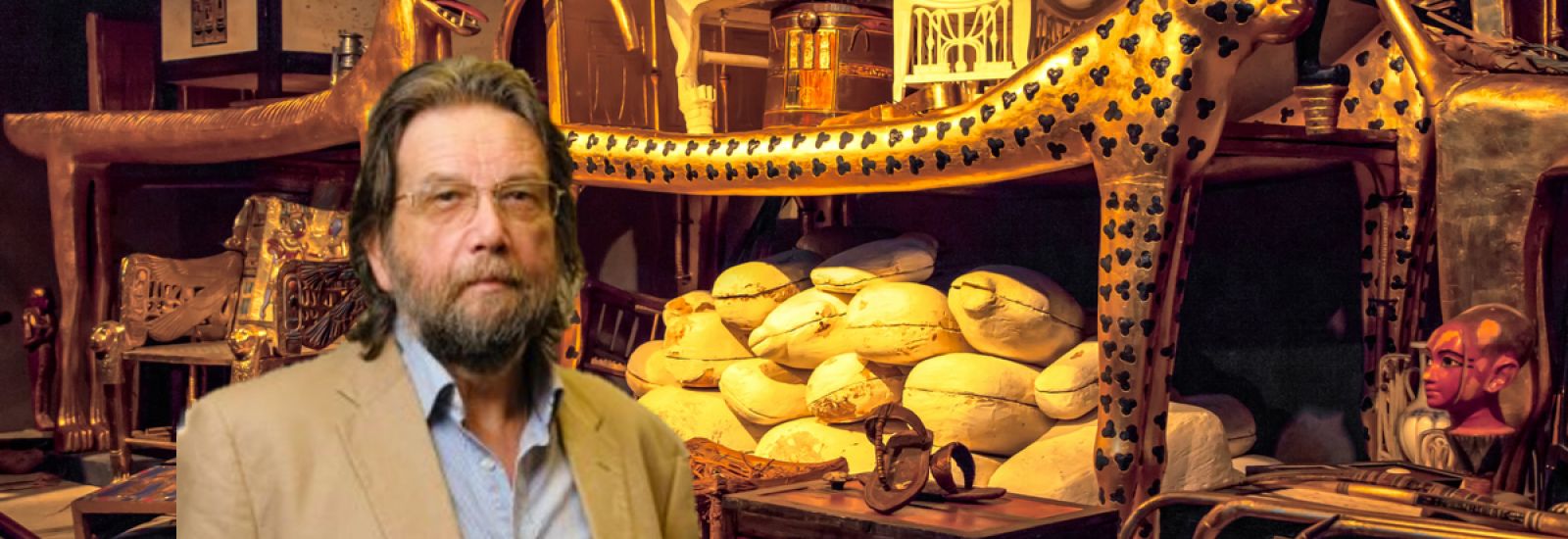
The dead grateful Professor Mark Pollard and why archaeology is not all treasure, trowels and Indiana Jones
It may not have been a rock and roll lifestyle that attracted Professor Mark Pollard to archaeology, but it has saved him from a career in nuclear energy or washing machines. For that, he thinks, was where he was heading, had it not been for the Tutankhamun exhibition of 1972. A decade before Indiana Jones made archaeology cool, that British Museum exhibition changed everything for the long-haired student physicist from the north.
Along with everyone else, he was intrigued by the golden death mask of the youthful Egyptian king [although he wants to make it clear that archaeology is not about treasure]. And he was intrigued by the parties he discovered were part and parcel of archaeology, when he subsequently volunteered on digs near his university at York. For a young physicist, accustomed to a very male scientific environment, this was indeed rock and roll.
He had the right hair, he acquired the hat; he has gone on to have a 40-plus year career at the forefront of modern archaeology and is, rather hesitantly – and not really – going into retirement from Oxford’s School of Archaeology later this year. Professor Mark Pollard came into archaeology as a postgrad, having completed his physics degree, and ‘retires’ this year as the Edward Hall Professor of Archaeological Science. But he has plans which do not include retirement and do not sound very retiring.
Professor Pollard was intrigued by the golden death mask of the youthful Egyptian king...And even more so by the parties he discovered were part and parcel of archaeology...For a young physicist, accustomed to a very male scientific environment, this was indeed rock and roll
As a postgrad entrant, he may have been slightly late to the ‘party’, but Professor Pollard clearly loves archaeology and his research, which has seen new scientific techniques introduced into the subject. While boots, trowels and trenches are still central to archaeology, so too now are the scientific methods of dating and analysis, without which no ‘dig’ programme is complete.
Archaeology has become the stuff of Hollywood, television series and even computer games – although Professor Pollard is no Lara Croft and certainly has not raided any tombs....He is grateful, though...[but] once gave a lecture entitled ‘Indiana Jones and the bucket of dirt’
Despite the high profile of such work, Professor Pollard is highly frustrated by – although accepting of – the razzmatazz around archaeology. Archaeology has become the stuff of Hollywood, television series and even computer games – although he is no Lara Croft and certainly has not raided any tombs. He is grateful, though, for the public exposure all this has brought and acknowledges the good work done by those who ‘have just three days’ and a TV crew. But he is wary of the overall impression – of treasure maps and ‘x’ marking the spot, of looters robbing tombs and soldiers locating ancient artefacts.
He laughs and says that he once gave a lecture entitled ‘Indiana Jones and the bucket of dirt’. He is not alone in his scepticism. The archaeology community in general objects to the idea of the treasure hunter. He says with typical gusto, ‘It’s not about bloody treasure.’
Having said that, he says, you cannot be too harsh when a subject has achieved stardom. He cheerfully admits ‘Archaeology is massively popular and has grabbed the public’s attention. But it could be so much more.
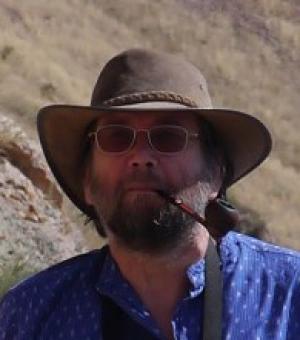
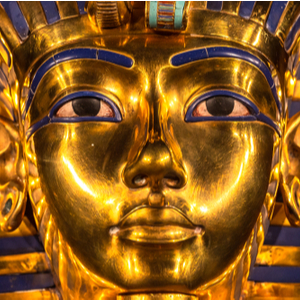
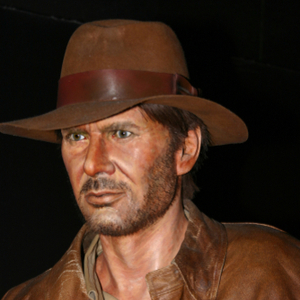
‘Gold is gold,’ he admits, reflecting on the fact a golden death mask first attracted him to archaeology. ‘But archaeology is about information and knowledge about people, and that can come in many (often unglamorous) forms’
It must have boosted sales of metal detectors [and hats] – and has also increased numbers wishing to study archaeology. But they are probably best not to mention the ‘T’ word in his hearing. In full flight, Professor Pollard insists, ‘The best archaeology is rooted in evidence.’
And he confesses to some very unscholarly shouting at the television when a recent programme declared a spectacular burial in Germany was that of a ‘Celtic prince’.
‘Absolutely ridiculous. It’s a Steppe Warrior,’ he cried emphatically at the voice-over. He had seen another identical burial in Siberia – which the TV team had clearly not.
Archaeology has been transformed over the last century, from the world of the gentleman amateur to adopt many cutting-edge scientific methods, in some large part thanks to Professor Pollard. But, despite his protests to the contrary, there is still a touch of the rock and roll about it – which he has not exactly tried to dispel.
You can take the physicist out of physics but you cannot take the Grateful Dead fan out of the 1970s and Professor Pollard smiles with satisfaction as he admits to having included lyrics and song titles from various favourite tracks in scholarly articles.
You can take the physicist out of physics but you cannot take the Grateful Dead fan out of the 1970s and Professor Pollard smiles with satisfaction as he admits to having included [song] lyrics and titles in scholarly articles
‘I put in some Dylan and some Jimi, but mostly lyrics from the Grateful Dead,’ he says with a conspiratorial smile.
A fondness for 1970s’ American rock groups aside, Professor Pollard certainly is not of the old-fashioned gentleman adventurers’ archaeologist mould.
‘I came from what would be called a deprived background,’ he says matter-of-factly. Having been born in New Zealand [a critical factor in his story, although he left as an infant], he grew up on a ‘mediocre council estate’ in the north of England. His father, a former Royal Marine musician, was invalided out of the service, bizarrely, thanks to a stomach ulcer and never really took to life as a factory worker, ‘He drank a lot and died quite young having never achieved anything he wanted to do.’
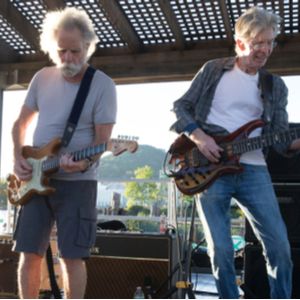 Some ageing, but apparently surviving Grateful Dead.
Credit: Shutterstock.
Some ageing, but apparently surviving Grateful Dead.
Credit: Shutterstock.‘I studied for my O levels by candlelight,’ he says, moving on.
Was that because of the three day week?
‘No, we hadn’t paid the bill.’
‘I studied for my O levels by candlelight,’ he says, moving on.
Was that because of the three day week?
‘No, we hadn’t paid the bill.’
But, thanks to the-then system, he says, ‘I was very lucky to be able to move upwards.’
Also, says Professor Pollard, the fact that he was born in New Zealand helped, ‘It gave me a sense of being different. I didn’t feel I belonged on the council estate...which was completely irrational.’
But he did do very well at school – although he had already developed an ability to speak his mind. The headmaster told him he should apply to Oxbridge.
‘I told him to stuff it,’ remembers Professor Pollard with a grin. The rebellious teenager had other plans. He intended to go to York, then a recently-established university – and wanted to study astronomy (every schoolchild was then transfixed by the moon landings). In fact, he went on to study theoretical physics. So, how did he get from there to a chair of archaeology at Oxford?
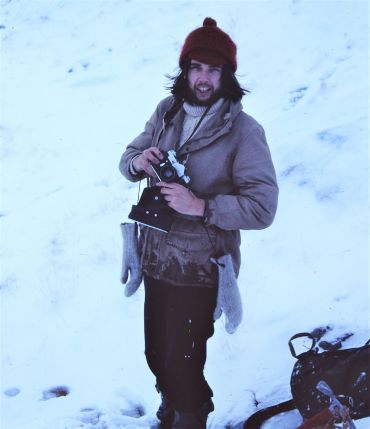 The young aspiring archaeologist
The young aspiring archaeologist‘It was great,’ he recalls. ‘It was closer to archaeology and I got to clamber all over York Minster....Now there’s such a thing as heritage science, it wasn’t invented then.’
Then, another chance saw him complete the transfer. With a recently-awarded doctorate in physics, he attended a conference in ‘archaeometry’, [which didn’t really exist then as a career, he says]. It was there, he met Oxford archaeology Professor Edward “Teddy” Hall (after whom Professor Pollard’s chair is named). He cornered him and brazenly asked for a job, saying he was ready to start immediately.
‘What do you know about Chinese ceramics?’ asked Professor Hall.
‘I know about medieval glass and I can learn,’ answered the new Dr Pollard.
The past really was another world, so in 1978 he found himself in Oxford, having an interview with the professor – and then being given a job. The transformation from physics to archaeology was complete.
Back in the 80s, Professor Pollard recalls visiting his employer’s house in Headington for parties [this was archaeology]. There was a swimming pool and, as though out of the Great Gatsby, Professor "Teddy" Hall would deploy his personal hot air balloon, giving rides to selected students.
Professor Hall was, says his protégé affectionately, ‘an 18th century gentleman-scholar’, a ‘man of science’, who paid from his private income for his work – and for that of the young Pollard.
It was an extraordinary time, according to Professor Pollard, who recalls visiting his employer’s house in Headington for parties [this was archaeology]. There was a swimming pool and, as though out of the Great Gatsby, Professor Hall would deploy his personal hot air balloon at some point, giving rides to selected students.
‘He was very much in the gentleman scholar mould,’ smiles Professor Pollard. ‘But I never got to go in the balloon.’
Professor Hall’s interest in Chinese ceramics proved seminal for his young apprentice, who went to China in 1982 for the first time and has been a Sinophile ever since, studying the manufacture of ancient Chinese pottery and bronzes. He spent years in the lab, using scientific techniques to study the precious objects – which sometimes involved using a drill (much to the horror of the owners).
But, as so often appears to happen in this story, by chance, after six years not going in the hot air balloon, he found himself applying for a job at the then University College Cardiff (now Cardiff University). From 1978, he was a lecturer in archaeology and chemistry at UCC [I did have A level chemistry, he says].
‘This wouldn’t happen now’, he observes.
‘I haven’t dug for a long time,’ he says, although he is full of admiration for the ‘fantastic work’. But, he says, you need to interpret data from different sources, from DNA to dating tests. ‘Every modern science has something to offer archaeology...but human beings are so much more than ‘hard science’,’ he says. ‘You need to look at what the people thought as well – see it how they saw it...it must have seemed like magic to them when green rock turned to a red liquid when it was heated.’
‘There was a revolution in archaeology in the late 70s,’ he says. Increasingly, science rather was having its impact on the subject and rather than spending his life in a trench or clutching a metal detector, Professor Pollard has been among the increasing number of archaeologists who have studied from a laboratory. Both ‘types’ are essential now, he says.
Every modern science has something to offer archaeology...but human beings are so much more than ‘hard science’...You need to look at what the people thought as well – see it how they saw it...it must have seemed like magic to them when green rock turned to a red liquid when it was heated
At just 34, he was approached in 1984 to be a full professor and the head of the department of archaeological science at Bradford University, which had been threatened with closure. While maintaining his research interests, and helping develop the field of scientific archaeology, the young head of department went on to become pro-vice-chancellor for research and became increasingly involved in university administration.
But it was the research, rather than the administration which interested him and, just at the point when he was wondering what to do next, the Edward Hall chair came up at Oxford. He applied and was appointed. That was 18 years ago – and, unable to break himself of the administration habit – he has been head of department at Oxford and lead on research for the social sciences division.
Coming back to Oxford has been ‘a complete privilege’, he says, ‘The people are incredible. I have been so lucky.’
Among his very fortunate breaks, Professor Pollard admits, has been participating in a far-sighted collaboration with Chinese archaeologists promoted by Jessica Rawson, which has seen a mixed group of Oxford and Beijing scholars travelling through China, Siberia and Central Asia, investigating the materials that came to be so important in the development of the region, ‘What we saw has had a huge influence on Chinese archaeology, so interesting and amazing.’
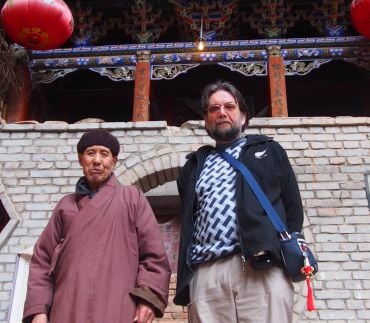 On a recent visit to China
On a recent visit to China‘You couldn’t understand what has happened without seeing it,’ he says. ‘One of the kilns we saw in Jingdezhen in 1982, when I first went to China, was from the time of the Qing dynasty...and was still going, but has now gone.’
Professor Pollard says, ‘It’s been like a kid’s dream. I’ve swum in Lake Baikal and become fascinated by the impact of Buddhism and the role of Buddhism in technological transfer.’
He is intrigued by how people invented things – how and why the Chinese were making egg-shell ceramics more than 2,000 years before anyone else could even attempt it.
‘They knew how to make things we didn’t know until the 19th century,’ he says. ‘Environment determines some things. But the Silk Road was like an information superhighway 2,000 years ago and ideas travelled.’
Professor Pollard voices considerable irritation at the current idea that only science subjects are worthy of pursuit – and funding. He insists that archaeology is based on science, but even more maintains that most subjects including Shakespeare studies can use ‘scientific’ methods of research, ‘The nature of the experiments are different, that’s all...it’s simplistic to say: science is good, other subjects are not.’
In typically robust style, he says, ‘To say the Humanities are a waste of time is just idiotic.’
By Sarah Whitebloom